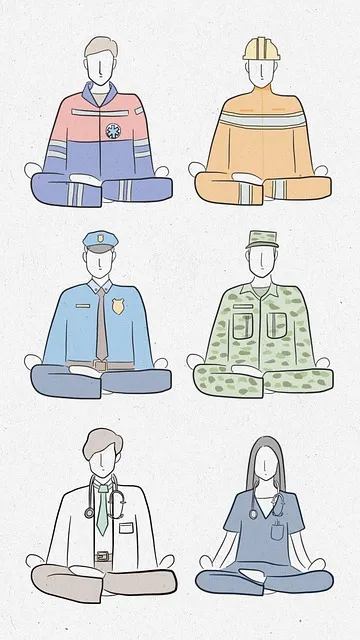Parker Kaiser Permanente is revolutionizing mental healthcare accessibility through innovative outreach programs that reduce stigma, facilitate appointments (including their dedicated mental health appointment phone number), and create safe spaces for open conversations about mental well-being. Their strategies include empathy workshops, awareness campaigns, peer support networks, mindfulness sessions, and risk management planning for professionals. Building strong community ties, transparent communication, and genuine relationships with local leaders are key to their success in fostering trust, dispel myths, and encouraging early intervention. Measuring the impact of these programs through metrics like sustained participation and emotional regulation improvements is crucial for promoting a culture of mental wellness and resilience.
Community outreach programs play a pivotal role in enhancing mental healthcare accessibility, especially for underserved populations. This article explores various facets of community engagement strategies, drawing insights from Parker Kaiser Permanente’s innovative approach to increasing mental health appointments. We delve into the importance of building trust, addressing stigma, and measuring the long-term impact of these initiatives. Discover how organizations like Parker Kaiser Permanente are revolutionizing mental healthcare through effective outreach, ensuring that resources reach those who need them most, including finding the Parker Kaiser Permanente mental health appointment phone number for convenient access.
- Understanding Community Outreach: Its Role and Impact in Mental Health Support
- Parker Kaiser Permanente's Approach to Increasing Access to Mental Healthcare
- Strategies for Effective Community Engagement: Building Trust and Relationships
- Overcoming Barriers: Addressing Stigma and Misconceptions About Mental Health Services
- Measuring Success: Evaluating the Effectiveness of Outreach Programs and Their Long-Term Benefits
Understanding Community Outreach: Its Role and Impact in Mental Health Support

Community outreach programs play a pivotal role in addressing mental health challenges, especially in reducing the stigma surrounding mental illness. By reaching out to communities directly, organizations like Parker Kaiser Permanente can facilitate mental health appointment accessibility and foster open conversations about psychological well-being. This strategy is crucial in engaging hard-to-reach populations who might face barriers such as geographical constraints or social anxiety when seeking support.
These initiatives often incorporate Empathy Building Strategies and Mind Over Matter Principles to create safe spaces where individuals feel understood and encouraged. Through interactive workshops, awareness campaigns, and peer support networks, community outreach aims to normalize conversations about mental health, encourage early intervention, and promote long-term well-being. Such efforts have the potential to significantly impact individuals’ lives, breaking down barriers and fostering inclusive support systems.
Parker Kaiser Permanente's Approach to Increasing Access to Mental Healthcare

Parker Kaiser Permanente has pioneered innovative community outreach programs to tackle mental health challenges head-on. Their approach focuses on increasing access to mental healthcare services, ensuring that support is available to all who need it. By implementing a range of initiatives, they aim to reduce barriers to care.
One key strategy involves expanding the reach of their mental health appointment phone number, making it easily accessible for community members. Additionally, Parker Kaiser Permanente actively promotes Mindfulness Meditation workshops and Mental Illness Stigma Reduction Efforts, fostering an inclusive environment. They also prioritize Risk Management Planning for Mental Health Professionals, ensuring a safe and supportive practice setting. These comprehensive efforts underscore the organization’s commitment to revolutionizing mental healthcare accessibility within their community.
Strategies for Effective Community Engagement: Building Trust and Relationships

Building strong community ties is paramount for successful implementation of outreach programs, especially when addressing sensitive topics like mental health. Organizations like Parker Kaiser Permanente can serve as key facilitators by fostering trust and empathy through transparent communication. Sharing information about services, such as the mental health appointment phone number, openly and honestly helps dispel myths and reduce stigma associated with seeking help—a crucial aspect in encouraging those struggling with mental illness to seek support.
Community engagement strategies should prioritize building genuine relationships with local leaders and residents. This involves actively listening to community needs and concerns, adapting outreach efforts accordingly, and promoting inclusive dialogue around mental health. By integrating Mental Illness Stigma Reduction Efforts into these interactions, organizations can contribute to a broader goal of Depression Prevention while advocating for evidence-based Mental Health Policy Analysis and Advocacy at the local level.
Overcoming Barriers: Addressing Stigma and Misconceptions About Mental Health Services

Overcoming barriers to accessing mental health services is a crucial step in fostering community wellness. Stigma and misconceptions often deter individuals from seeking support, especially in underserved communities. Many people still view mental health issues as a sign of weakness or personal failure, leading to embarrassment and avoidance. To combat this, Community outreach programs can play a vital role in raising awareness, dispelling myths, and encouraging open conversations about mental wellness.
By implementing Mental Wellness Coaching Programs and Trauma Support Services, organizations like Parker Kaiser Permanente can reach out to communities, offering education, resources, and accessible appointment options through phone lines dedicated to mental health support (e.g., the Kaiser Permanente mental health appointment phone number). These initiatives aim to normalize conversations about mental health, improve self-esteem, and provide alternative support systems, ensuring that individuals feel comfortable seeking help for their emotional well-being.
Measuring Success: Evaluating the Effectiveness of Outreach Programs and Their Long-Term Benefits

Measuring success is a crucial aspect of community outreach programs, as it allows for a deep understanding of their impact and effectiveness. Evaluating these initiatives goes beyond immediate outcomes; it involves assessing long-term benefits that can profoundly influence community well-being. For mental health outreach programs, such as those aimed at increasing access to services through the Parker Kaiser Permanente mental health appointment phone number, success metrics could include sustained participation rates in follow-up sessions and improvements in emotional regulation among program beneficiaries.
Over time, these programs may contribute to burnout prevention strategies for healthcare providers by reducing the burden of unmet mental health needs within the community. By integrating outreach efforts with robust evaluation methods, organizations can identify what works best and make data-driven adjustments, ultimately fostering a culture of mental wellness and resilience in the long run.
Community outreach programs, as exemplified by Parker Kaiser Permanente’s innovative approach, play a pivotal role in enhancing mental healthcare accessibility. By implementing strategies that build trust and overcome stigma, these initiatives ensure that support reaches those who need it most. As highlighted in the article, effective outreach involves understanding local needs, fostering strong community relationships, and evaluating long-term impacts. Encouragingly, programs like Parker Kaiser Permanente’s not only increase access to mental health appointments (including through their dedicated phone number) but also contribute to a more inclusive and supportive society.






